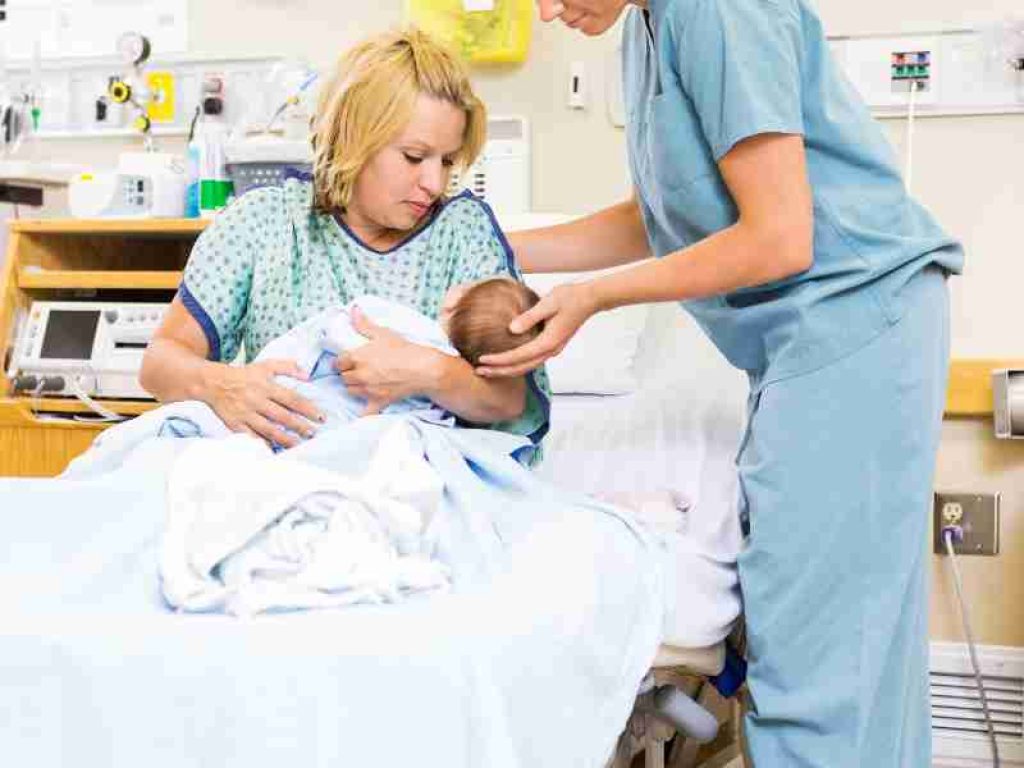
What Is A Mother Baby Nurse?
To find out what is a mother baby nurse? You’ve found this article. A mother-baby or postpartum nurse is a registered nurse who provides care for mothers and infants shortly after birth.
As a patient, it can be difficult to find your care around the health care system. If you have ever considered becoming a nurse or wondered who cared for you during your most recent care stay, this post is for you.
What is a mother baby nurse?
Mother Baby Nurse are also called as postpartum nurses. Postpartum nurses provide help and support to new parents in the days and hours following childbirth. They employ a wide variety of professional abilities to ensure the safety and well-being of the infants in their care, from providing emotional and physical support to mothers throughout the postpartum period to recognizing and responding to any signs of medical distress in the newborns in their care.

Postpartum nurses operate in high-pressure settings like hospitals and birthing facilities, where they assist a multidisciplinary team of doctors and other nurses in responding to emergencies.
What does a mother baby nurse do?
A mother-baby nurse’s duties include, among others:
- Tracking of Mother and Infant
- Evaluate for difficulties after birth and in the postpartum period
- Keep an eye out for signs of difficulties in newborns
- Offer guidance on nursing.
- Immunizations should be given.
- Distribute medication
- Discuss methods of birth control that can be used after the postpartum is born.
- Perform postpartum and newborn screenings
- Make suggestions for postpartum support services.
- Keep a warm, friendly, and secure space for mom and baby
- Work with other medical staff to ensure the health of both care and care, and educate patients as needed.
What a mother-baby nurse can do is limitless; this is only one example! The duties of a mother-baby nurse are highly variable, depending on the nurse’s education, the state’s nursing board, the company’s policies, and the laws in effect.
How to Become a Mother Baby Nurse?
After the nursing student leaves school and becomes certified as an RN, he/she is then entitled to apply for a postpartum nursing position. Working in this specialist sector is usually open to new graduating RNs but will require training after hire.

To do this, postpartum nurses typically spend time both studying in a classroom setting (called “didactic”) and shadowing an experienced nurse in the field (called “precepting”) to develop their critical thinking skills. A career in postpartum nursing would be a logical step for a nurse with several years of experience, and they can pursue it by applying to birthing centers or hospitals.
Most medical facilities require nurses to have at least one year of bedside experience before working in labor and delivery, with many nurses gaining their experience in the postpartum unit first.
1. Pursue a Degree
Earning a nursing degree from an approved university is the first requirement for becoming a postpartum nurse. A nursing education can take anywhere from two years to four years, culminating in either an associate’s or a bachelor’s degree.
This will require academic study in fields like anatomy, physiology, medical terminology, etc. Clinical labs and observations are another way in which students gain real-world experience. In addition to required coursework, future postpartum nurses may take electives in neonatal nursing, obstetrics, and maternal health.
2. Pass the NCLEX Exam
Students are required to take and pass the NCLEX after completing an undergraduate nursing programmed. As a condition of practicing as a registered nurse or nurse practitioner in the United States, you must pass the National Council Licensure Examination. Candidates for the registered nurse license examination (NCLEX-RN) need only have a high school diploma or GED to sit for the exam, which assesses their knowledge and abilities in four key areas:
- Preventative care
- Health care facilities
- Consistency of psychological and social functioning
- Maintaining a healthy body
Most of the questions on the NCLEX are multiple-choice, and depending on how well you do in the first section, you’ll have to answer anywhere from 75 to 265 of them. Students get six hours to finish the exam, which includes many breaks.
3. Earn your License
In order to practice nurse legally after passing the exam, nurses need to apply for a license in their intended state of employment. It’s crucial to do your homework before applying because each state has its own set of rules and regulations.
A nursing degree, a passing score on the NCLEX, and a clean criminal record check are often necessities in most states. A nurse’s authorization to practice lasts for five years. In order to maintain their licenses, registered nurses in several states must enroll in ongoing training. Before applying for or renewing a license, you should look into the specific regulations in your area.
4. Create a resume and start applying for jobs
Registered nurses who have earned either an ADN or BSN degree are commonly considered for positions in healthcare facilities such as hospitals, clinics, and other similar institutions. Nurses can find employment openings through a variety of channels, such as internet job boards, professional networks, and medical magazine advertisements.
Although some postpartum nurses jump right into the workforce after earning their credentials, others may need extensive mentoring from more seasoned colleagues before they are ready to take charge. A nurse can learn the ins and outs of postpartum medicine by shadowing more experienced nurses, witnessing procedures, and talking to patients.
5. Consider Certification
Many postpartum nurses decide to get certified so they can better their employment opportunities. Postpartum nurses might select from a variety of appropriate credentials. The National Certification Corporation is known for offering a number of popular certifications, including Maternal Newborn Nursing (MNN) and Electronic Fetal Monitoring (EFM).
Postpartum nurses seeking the MNN credential are expected to have not only two years and 2,000 hours of experience dealing with mothers and infants, but also an unrestricted RN license and extensive documentation of their work history.
To earn their MNN credentials, candidates must pay $325 and complete an online exam in fewer than six hours. Postpartum nurses seeking EFM certification must hold an active license to practice as a registered nurse, nurse midwife, paramedic, or a job with similar responsibilities.
They have to pay $210 and take a six-hour online test to earn the credential. There are a total of 125 multiple-choice questions in the exam, all of which are directly relevant to the care and upkeep of EFM tools.
How much education do postpartum nurses need?
Registered nurses with an associate’s degree in nursing (ADN) or a bachelor’s degree in nursing (BSN) can apply for postpartum nursing jobs at most hospitals. In some healthcare facilities, RNs must have a bachelor’s degree or above. A registered nurse’s (RN) license from the state where the postpartum nurse would be working is necessary for this position.
State Board of Nursing requirements for obtaining a registered nurse license include completing an approved nursing education program and completing the National Council Licensure Examination for Registered Nurses (NCLEX-RN).
Is There a Need for Specific Licenses?
A postpartum nurse might choose from a few different certifications. To begin, many hospitals now insist that their medical staff be certified in Electronic Fetal Monitoring. Another essential certification is the Maternal and Newborn Nursing Certification.
Earning this credential demonstrates your knowledge and commitment to your field. Although certification in this area is not necessary for employment, many hospitals require it after a certain number of years on the job. Work experience of at least 24 months in the field is required.
Where Do Mother-Baby Nurses Work?
Most of a mother’s first nursing job will be in a hospital’s postpartum ward.
However, the following are some additional possible workplaces:
- Gynecology clinics/doctorates
- Clinical research institutions
- Health administration offices
- Charities and other non-profit groups
- New ventures in telehealth
- Defense Medical Facilities
- Medical product manufacturers
- Health care facilities serving the community, and much more
Mother-baby nurses may also consult for other companies, hold positions in nursing administration, or teach at higher education institutions.
Labor and delivery nurse vs. mother-baby nurse
There is a close relationship between a labor and delivery nurse and the childbirth process. A mother-baby nurse is present soon after postpartum to assess any immediate requirements. Registered nurses with expertise in obstetrics and childbirth are regularly called upon to assist with the delivery process and monitor the progress of labor.
Mother-baby nurses provide greater hands-on instruction in areas like breastfeeding, newborn care, and more to mothers, especially first-time mothers. While mother-baby nurses and those who specialize in labor and delivery may work together during patient transfers, their responsibilities are distinct. Both of these professions involve working with new families and their newborns.
Mother-baby nurses, on the other hand, are highly trained to educate new parents and keep a close eye on new arrivals. The role of mother-baby nurses is to conduct diagnostic tests on newborns and keep an eye out for issues, such as postpartum hemorrhage, that may arise soon after postpartum. You should really care about mothers and babies and want to learn as much as you can about these topics if you want to become a mother-baby nurse.
The Benefits To Your Family Of A Mother Baby Nurse:
One nurse tends to both the mother and the baby in mother-baby nursing. This may seem obvious and elementary, but many healthcare facilities do not provide mother-baby nursing. Instead, they have specialized nurses for both mothers and infants, called “mother nurses” for baby care and “baby nurses” for newborn care in a nursery.
Having separate nurses for mother and baby may seem like a step up in specialized care, but it can lead to more chaos, missed opportunities, and rigidity. When there is more than one nurse providing care, there is a greater chance of miscommunication. It’s easy for messages to get garbled or misinterpreted. Nursing care for both mother and baby, with an emphasis on promoting attachment and bonding in the new family unit, is provided by mother-baby nurses.

In fact, when a nurse assists a mother with her infant, she is aiding the entire family. Included are Dad and other family members, or anybody the new mother considers to be “family.” A typical day is rearranged to accommodate the requirements of the family. The mother-baby nurse provides daily assistance with schedule development for the new mother. Each family is treated individually, with care for their own unique set of circumstances rather than according to a predetermined hospital timetable.
- The nurse cares for both the mother and the baby, eliminating the need for two separate nurses. With just a quick handoff at shift change, one nurse may inform the next of each mother-child pair’s specific requirements.
- A faster response time when questions are asked. When mothers ask their postpartum nurses questions about their newborns, they often get the same response: “I don’t know.” The nursery attendant is the one you should consult. Also, the mother’s caretaker could inquire with the nursery nurse.
- When a woman nurses her own child, a nurse doesn’t need to consult with anybody else. If the mother has a question, she can ask one of the nurses who will know the solution. She is aware of this because she is currently helping to care for both mother and child.
- The nurse and the family are on a more intimate footing. The mother and nurse are more likely to form a bond based on mutual trust, care, and comfort when there are fewer nurses to choose from.
- More people in families are learning useful skills. The mother-baby nurse performs hands-on demonstrations of infant care while tending to the mother in bed.
- Moms treasure every moment they have with their child. If the infant remains in the nursery for the most majority of the day, the mother will miss out on hearing many of the baby’s first gurgles and coos. Most newborn care during mother-baby nursing occurs in the mother’s bedroom so that the mother can be present for these precious moments.
- The parents have faith that their infant is in good hands. Because the nurse provides care for the infant in the mother’s room, parents are able to observe the care their children receive. Every parent will know without a doubt that their child is the one weeping in the nursery.
- Safeguarding has been beefed up. Even if it’s uncomfortable to consider, breastfeeding improves a baby’s safety. Because babies aren’t continuously moving from the mother’s room to the nursery, the chances of a kidnapping are reduced. The presence of outsiders is made more visible when a family employs a mother-baby nurse instead of a larger team of caregivers.
Breastfeeding is a natural choice for new mothers and their infants. When parents are actively involved in their newborn’s care, they are more likely to feel a strong sense of attachment to their child, and they are more likely to leave the hospital with a higher level of confidence in their ability to raise their child.
What is it like to be a Mother Baby Nurse?
The role of postpartum nurse is one of significant responsibility. You are responsible for both the mother and the newborn infant. Between three and six patients are typically assigned to a postpartum nurse, and she or he is responsible for performing assessments of the mother’s health and condition following delivery, attending to physicians’ orders such as dressings, IVs, and medications, updating charts and care plans, attending to admissions, and providing new mothers with guidance, education, comfort, and a listening ear. The work entails dealing with the unpredictability of not every delivery.
How Much Does a Postpartum Nurse Usually Get Paid?
There is a wide variance in postpartum nurse salaries, but the average compensation in 2019 was $90,314 per year, according to ZipRecruiter. Nurses can make different amounts of money each year depending on factors including where they work, who they work for, how long they’ve been in the profession, and what kind of training and certifications they have. Medical insurance, paid time off to care for themselves or their families, and other benefits are standard for most postpartum nurses’ compensation packages.
In conclusion
A mother-baby nurse is an invaluable resource for new mothers and their infants. They provide the family with hands-on demonstrations of infant care while providing emotional support and comfort to the mother. They also help keep the baby safe by keeping them in the mother’s room as much as possible, reducing the chance of kidnapping. Furthermore, they also provide parents peace of mind that their child is receiving quality care at all times. Postpartum nurses are typically compensated well for their services with salaries averaging around $90,314 per year plus additional benefits.







